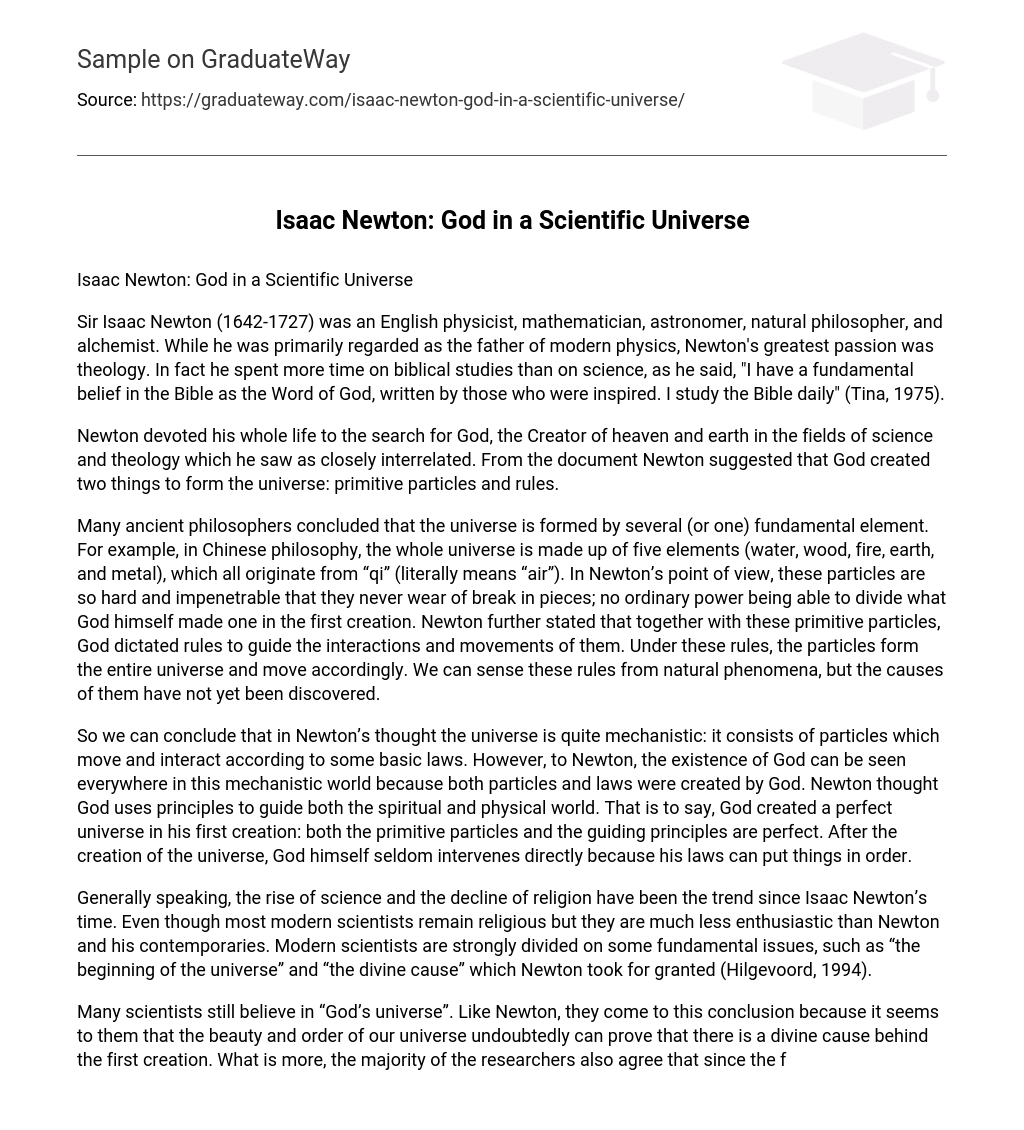Sir Isaac Newton (1642-1727) was an English physicist, mathematician, astronomer, natural philosopher, and alchemist. While he was primarily regarded as the father of modern physics, Newton’s greatest passion was theology. In fact he spent more time on biblical studies than on science, as he said, “I have a fundamental belief in the Bible as the Word of God, written by those who were inspired. I study the Bible daily” (Tina, 1975).
Newton devoted his whole life to the search for God, the Creator of heaven and earth in the fields of science and theology which he saw as closely interrelated. From the document Newton suggested that God created two things to form the universe: primitive particles and rules.
Many ancient philosophers concluded that the universe is formed by several (or one) fundamental element. For example, in Chinese philosophy, the whole universe is made up of five elements (water, wood, fire, earth, and metal), which all originate from “qi” (literally means “air”). In Newton’s point of view, these particles are so hard and impenetrable that they never wear of break in pieces; no ordinary power being able to divide what God himself made one in the first creation. Newton further stated that together with these primitive particles, God dictated rules to guide the interactions and movements of them. Under these rules, the particles form the entire universe and move accordingly. We can sense these rules from natural phenomena, but the causes of them have not yet been discovered.
So we can conclude that in Newton’s thought the universe is quite mechanistic: it consists of particles which move and interact according to some basic laws. However, to Newton, the existence of God can be seen everywhere in this mechanistic world because both particles and laws were created by God. Newton thought God uses principles to guide both the spiritual and physical world. That is to say, God created a perfect universe in his first creation: both the primitive particles and the guiding principles are perfect. After the creation of the universe, God himself seldom intervenes directly because his laws can put things in order.
Generally speaking, the rise of science and the decline of religion have been the trend since Isaac Newton’s time. Even though most modern scientists remain religious but they are much less enthusiastic than Newton and his contemporaries. Modern scientists are strongly divided on some fundamental issues, such as “the beginning of the universe” and “the divine cause” which Newton took for granted (Hilgevoord, 1994).
Many scientists still believe in “God’s universe”. Like Newton, they come to this conclusion because it seems to them that the beauty and order of our universe undoubtedly can prove that there is a divine cause behind the first creation. What is more, the majority of the researchers also agree that since the first creation of God is perfect, he lets these natural laws rule instead of often intervening.
However, modern versions of the first creation usually differ a lot from Newton’s, partly due to the fast development of science and technology and lots more experimental data. After World War II, two distinct theories emerged. One was Fred Hoyle’s steady state model, holding that the universe roughly remains the same. The other was Lemaitre’s big bang theory, advocated and developed by George Gamow, who predicted the cosmic microwave background (CMB). The big bang theory?which is accepted by most physicists today, holds that the universe began about 20 billion years ago from an explosion of a very small mass of matter at extremely high density and temperature (“Sci-Tech Dictionary”, 2003).
There are many variations of the big bang theory. In the most common models the original mass of matter was very rapidly expanding and cooling. During the cosmic inflation the universe grew exponentially. After inflation stopped, temperatures were so high that particle-antiparticle pairs of all kinds were being continuously created and destroyed in collisions during their fast motion. The outcome is the predominance of matter over antimatter in the present universe (“Sci-Tech Dictionary”, 2003). Evidently, the big bang theory is much more complicated and better supported by observations and experiments than Newton’s reasoning on the origin of the universe: it can explain why the universe is so homogeneous . However, the big bang theory lets many questions unanswered. For instance, the state before the big bang, the cause of the big bang, and the apparent excess of matter over antimatter.
In conclusion, in Isaac Newton’s point of view, God created primitive particles and principles guiding these particles’ motion and interactions, after his first perfect creation, God seldom interferes but let nature take its course. On the one hand, most modern scientists agree that it is God who created our perfect universe which is basically self monitoring. On the other hand, though strongly divided, they generally accept the big bang theory, which is far more developed than Newton’s version about God’s creation of the universe. Nevertheless, both Newton and modern scientists agree that the fundamental laws of the universe remain hidden.
Refrences
Hilgevoord, J. (1994). Physics and our view of the world. Cambridge: Cambridge University
Press.
McGraw-Hill Dictionary of Scientific and Technical Terms, 6th edition. (2003). Big bang theory. Columbus, OH :The McGraw-Hill Companies.
Tiner, J. H. (1975). Isaac Newton: inventor, scientist and teacher. Fenton, MI: Mott Media.





